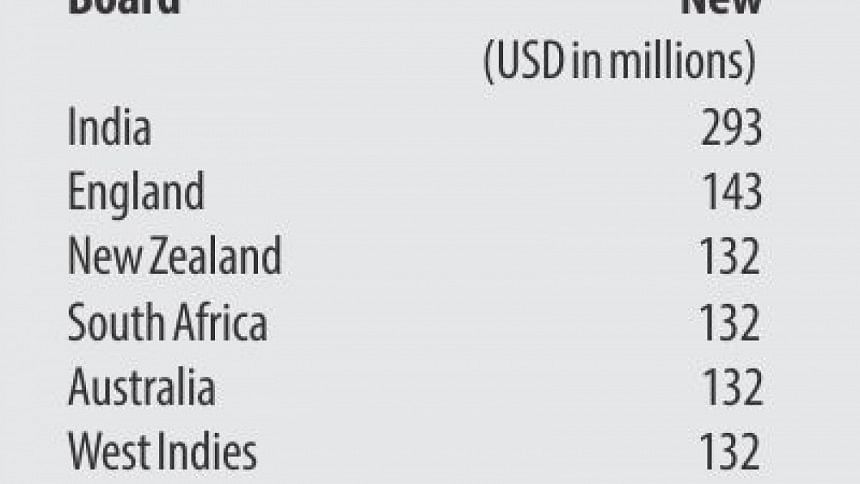BCCI out in the cold, but door still open

The International Cricket Council (ICC) concluded a five-day meeting at its headquarters in Dubai yesterday with the members deciding to proceed with the new financial model, passing it with a vote of 13 to one, the game's governing body said in a statement on its website yesterday.
The approval of the new distribution model may effectively bring about the end of the Big 3 system of governance -- which saw India, England and Australia take the biggest chunks of ICC's lucrative pie -- but there is still time before the changes are ratified by the ICC's full council in an annual conference in June.
The financial restructure was agreed to in principle in February, but India remained strongly opposed to the reforms and they were reportedly the only country to vote against it.
The revised distribution for the 2016-2023 cycle will see India's share of the revenue halved.
The ICC-appointed working group proposed the new financial model has to be guided by the following principles: equity, good conscience, common sense and simplicity, enabling every member to grow, revenue generated by members and greater transparency. Another principle was the recognition of interdependency among members -- that cricket playing nations need each other and the more strong nations there are, the better for the sport.
100M OFFER TO INDIA STILL ON
According to reports from ESPNCricinfo, immediately after the BCCI was outvoted at the ICC board meeting on Wednesday, Manohar informed BCCI secretary Amitabh Choudhury that the settlement offer of an additional USD 100 million was still on the table.
The BCCI seemed confident of stopping the vote from passing, but they were blindsided when the Bangladesh Cricket Board (BCB), West Indies Cricket Board (WICB) and Zimbabwe Cricket (ZC), long-standing allies of the Indian board, all voted in favour of the proposal.
ESPNCricinfo quoted one official as saying that the main reason behind these three boards changing their stances was the ICC's offer to provide them financial help, adding that ZC could be given USD19 million to clear its debt while the WICB maybe be given a USD40 million grant.
A source who has worked closely with Manohar since he arrived at the ICC last year said he has no "desire to alienate" the BCCI. He has asked the ICC to continue engaging with the BCCI.
Choudhury told the ICC that he would need to head back to the BCCI, which will take a final decision at a special general body meeting (SGM).
The official said India still had the bargaining power because of its importance in bilateral cricket. He pointed out that the ICC might need to increase its settlement offer and "go beyond" the proposed $100 million.
"There are two ways of resolving this now. One is the SGM says okay, 390 [USD 293 million plus 100 million] is good. Let us go ahead. The ICC will agree immediately and resolve it. Or [the SGM] says we need more time. Then there will be another round of negotiations [with the ICC]."
However, the scope of any further negotiations, the source pointed out, was remote. "He [Manohar] would still want to negotiate with the BCCI, but would he take it beyond $390 million? Questionable."
One other interested party, which could play the catalyst, is the Committee of Administrators (CoA). Any decision taken by the BCCI office bearers would need to be conveyed to the CoA, which would need to approve anything that is sent in writing to the ICC as per the court order. "The CoA can step in, but it will only step in also at USD 445 million [which the BCCI considers a middle ground]," the official said.
NEW CONSTITUTION AGREED
The members of the ICC also voted 12 to two on a new constitution to be put before the ICC full council in the ICC's annual conference.
The major changes include the potential to include additional Full Members in the future subject to meeting membership criteria and the removal of the Affiliate Members. A membership criteria and a membership committee will be established to consider membership applications, while the potential for reclassification of Full Membership -- one of the clauses which Bangladesh was strongly opposed to -- was removed.
All the board members will also have an equal weight of votes regardless of membership status and all members will be entitled to attend the AGM. Other changes include the introduction of an independent female director and a deputy chairman of the board who will be a sitting director elected by the board.
OTHER ISSUES
Talks about bringing more context to international bilateral cricket are ongoing and the board noted the collective will to resolve the current calendar congestion in order to bring a clear framework to all three formats.
The ICC board also considered an update following the ICC delegation to the Pakistan Super League final in Lahore as part of its commitment to support the return of international bilateral cricket to Pakistan as long as it is safe. The feasibility of further matches in Pakistan involving a World XI is now being considered from a security and budget perspective.
The chief executives' committee also reconfirmed its support for cricket's inclusion in the Olympics.

 For all latest news, follow The Daily Star's Google News channel.
For all latest news, follow The Daily Star's Google News channel. 



Comments